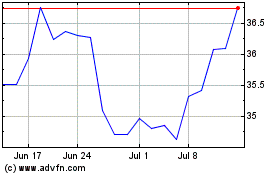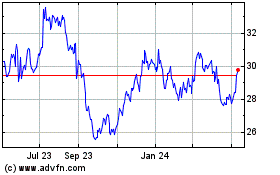Intel Announces New Chips for Cloud Computing
March 31 2016 - 7:10PM
Dow Jones News
Intel Corp. announced new chips targeting cloud computing as
well as partnerships to address concerns of companies that have
stayed on the sidelines of that technology trend.
The Silicon Valley giant, whose chips power the vast majority of
server systems, on Thursday expanded its Xeon line with new models
that boost computing performance. Intel executives, at an event in
San Francisco, also pointed to built-in features that could boost
the security of cloud computing jobs.
Intel also announced a collaboration with two startups, CoreOS
and Mirantis Inc., could make it easier for companies to move
computing jobs between competing cloud services, or between their
own data centers and the cloud.
"Any business is going to use multiple clouds," said Diane
Bryant, the Intel senior vice president who heads Intel's
data-center group. "The concern is, 'please don't lock me in.'
"
The Santa Clara, Calif., chip maker has benefited from the
immense numbers of servers purchased by cloud services like those
of Amazon.com Inc., Microsoft Corp. and Google Inc. But it also
wants to spur innovation at smaller cloud providers and the many
other companies trying to equip their own data centers with
cloudlike technology.
Intel's efforts to promote cloud computing focus on two open
source programs. One is OpenStack, which acts as a kind of
dashboard to control resources in a data center. It comes in
commercial versions from companies including Mirantis as well as
free, open-source versions.
The other is called containers, software wrappers for small
programs that can work together. CoreOS distributes a program
called Kubernetes—originally an internal project of Google that the
company gave away under an open-source license—that simplifies the
task of managing large numbers of containers.
Intel's alliance with CoreOS and Mirantis is intended to let
companies more easily use both technologies without maintaining a
separate cluster of computers for each, Ms. Bryant said. Merging
aspects of Kubernetes and OpenStack would make it easier for
companies to move computing chores between multiple cloud providers
and their own data centers, she and other industry executives
said.
Many companies will appreciate the freedom created by the new
alliance, "unless you think that Amazon is the one true cloud,"
said Chad Arimura, chief executive of Iron.io, a San Francisco
startup offering related software tools.
To help companies worried about other technical issues arising
from cloud computing, Intel and VMware Inc., a vendor of
data-center software, said they would jointly establish "centers of
excellence." These facilities would help customers test cloud
techniques without buying new technology or moving jobs to cloud
service vendors.
Intel's new chips exploit its latest production recipe to pack
more circuitry on each piece of silicon. The new Xeon E5-2600 v4
family, as its called, includes up to 22 calculating engines on
each chip, up from a maximum of 18 on prior models.
The Xeons also have built-in features that can encrypt data more
quickly than prior models, for security purposes, and include a new
feature to maximize the use of built-in memory circuitry for the
most important tasks. The chips will be used by new servers from
companies that include Dell Inc., HP Inc. and Cisco Systems
Inc.
In addition to the chips, Intel said it introduced faster data
storage devices, called solid-state drives, or SSDs, that use NAND
flash memory chips produced as part of a partnership with Micron
Technology Inc. The SSDs are Intel's first to contain chips based
on a technology called 3-D NAND, which boosts storage capacity by
using many layers of circuitry rather than squeezing the size of
transistors.
Write to Don Clark at don.clark@wsj.com
(END) Dow Jones Newswires
March 31, 2016 18:55 ET (22:55 GMT)
Copyright (c) 2016 Dow Jones & Company, Inc.
HP (NYSE:HPQ)
Historical Stock Chart
From Mar 2024 to Apr 2024

HP (NYSE:HPQ)
Historical Stock Chart
From Apr 2023 to Apr 2024
